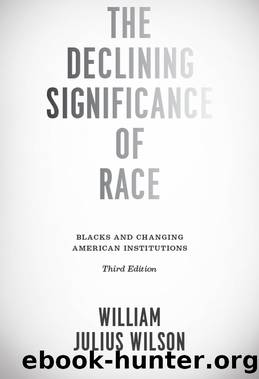The Declining Significance of Race by William Julius Wilson

Author:William Julius Wilson [Wilson, William Julius]
Language: eng
Format: epub
Tags: Sociology, History, Politics
ISBN: 9780226901299
Barnesnoble:
Goodreads: 327380
Publisher: University of Chicago Press
Published: 1978-01-01T00:00:00+00:00
7
THE DECLINING SIGNIFICANCE OF RACE
This study has revealed that although racial oppression, when viewed from the broad perspective of historical change in American society, was a salient and important feature during the pre-industrial and the industrial periods of race relations in the United States, the problems of subordination for certain segments of the black population and the experiences of social advancement for others are more directly associated with economic class in the modern industrial period. In arriving at this conclusion, I have been careful to recognize the manner in which economic and political changes have gradually shaped a black class structure, making it increasingly difficult to speak of a single or uniform black experience. Although a small elite population of free, propertied blacks did in fact exist during the antebellum period, the interaction between race and economic class only assumed real importance for blacks in the late part of the industrial era of race relations; the significance of this relationship has grown as the nation has entered the modern industrial period. In this chapter I should like, by way of summary and conclusion, to outline some of the basic theoretical and substantive arguments I have advanced regarding racial change in America and to redefine some of the problems that are generally perceived as racial in nature.
Each of the major periods of American race relations has been shaped in different measure both by the systems of production and by the laws and policies of the state. However, the relationships between the economy and the state have varied in each period and therefore the roles of both institutions in shaping race relations have differed over time.
In the preindustrial period the slave-based plantation economy of the South allowed a relatively small, elite group of planters to develop enormous regional power. The hegemony of the southern ruling elite was based on a system of production that required little horizontal or vertical mobility and therefore could be managed very efficiently with a simple division of labor that virtually excluded free white labor. As long as free white workers were not central to the process of reproducing the labor supply in the southern plantation economy, slavery as a mode of production facilitated the slaveholderâs concentration and consolidation of economic power. And the slaveholders successfully transferred their control of the economic system to the political and legal systems in order to protect their class interest in slavery. In effect, the polity in the South regulated and reinforced the system of racial caste oppression depriving both blacks and nonslaveholding whites of any meaningful influence in the way that slavery was used in the economic life of the South. In short, the economy provided the basis for the development of the system of slavery and the polity reinforced and perpetuated that system. Furthermore, the economy enabled the slaveholders to develop a regional center of power and the polity was used to legitimate that power. Since nonslaveholding whites were virtually powerless both economically and politically, they had very little effect on the developing patterns of race relations.
Download
This site does not store any files on its server. We only index and link to content provided by other sites. Please contact the content providers to delete copyright contents if any and email us, we'll remove relevant links or contents immediately.
Nudge - Improving Decisions about Health, Wealth, and Happiness by Thaler Sunstein(7706)
The Fire Next Time by James Baldwin(5441)
iGen by Jean M. Twenge(5414)
Adulting by Kelly Williams Brown(4574)
The Sports Rules Book by Human Kinetics(4385)
The Hacking of the American Mind by Robert H. Lustig(4381)
The Ethical Slut by Janet W. Hardy(4251)
Captivate by Vanessa Van Edwards(3839)
Mummy Knew by Lisa James(3691)
In a Sunburned Country by Bill Bryson(3541)
The Worm at the Core by Sheldon Solomon(3486)
Ants Among Elephants by Sujatha Gidla(3467)
The 48 laws of power by Robert Greene & Joost Elffers(3291)
Suicide: A Study in Sociology by Emile Durkheim(3022)
The Slow Fix: Solve Problems, Work Smarter, and Live Better In a World Addicted to Speed by Carl Honore(3009)
The Tipping Point by Malcolm Gladwell(2920)
Humans of New York by Brandon Stanton(2873)
Get What's Yours for Medicare: Maximize Your Coverage, Minimize Your Costs by Philip Moeller(2727)
Handbook of Forensic Sociology and Psychology by Stephen J. Morewitz & Mark L. Goldstein(2704)
